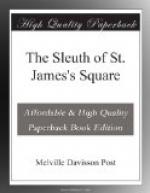Now, as he sat alone before the fire in the colony room of the Empire Club and thought about it, the thing did seem inexplicable. Why should the metropolitan police care who imported horses, or in what port a shipload of them was landed? The war was over. Nobody was concerned about the importation of horses. Why should Sir Henry be so disturbed about it? But he was disturbed; and he had rushed off to Paris to see an expert on ciphers. That seemed a tremendous lot of trouble to take. The Baronet knew the horses were on the sea coming from America, he said. If he knew that much, how could he fail to discover the boat on which they were carried and the port at which they would arrive? Nobody could conceal nine hundred horses!
Hargrave was thinking about that, idly, before the glow of the coal fire, when the second episode in this extraordinary affair arrived.
A steward entered.
“Visitor, please,” he said, “to see Mr. Hargrave.”
Then he presented his tray with a card. The jewel dealer took the card with some surprise. Everybody knew that he was at the Empire Club. It is a colony thing with chambers for foreign guests. A list of arrivals is always printed. He saw at a glance that it was not a man’s card; the size was too large. Then he turned it over before the light of the fire. The name was engraved in script, an American fashion at this time.
The woman’s card had surprised him; but the name on it brought him up in his chair — “Mrs. A. B. Farmingham.” It was not a name that he knew precisely; but he knew its genera, the family or group to which it belonged. Mr. Jefferson removed titles of nobility in the American republic, but his efforts did not eliminate caste zones. It only made the lines of cleavage more pronounced. One knew these zones by the name formation. Everybody knew “Alfa Baba” Farmingham, as the Sunday Press was accustomed to translate his enigmatical initials. Some wonderful Western bonanza was behind the man. Mrs. “Alfa Baba” Farmingham would be, then, one of the persons that Hargrave’s house was concerned to reach. He looked again at the card. In the corner the engraved address, “Point View, Newport,” was marked out with a pencil and “The Ritz” written over it.
He got his coat and hat and followed the steward out of the club. There was a carriage at the curb. A footman was holding the door open, and a woman, leaning over in the seat, was looking out. She was precisely what Hargrave expected to see, one of those dominant, impatient, aggressive women who force their way to the head of social affairs in America. She shot a volley of questions at him the moment he was before the door.
“Are you Douglas Hargrave, the purchasing agent for Bartholdi & Banks?”
The man said that he was, and at her service, and so forth. But she did not stop to listen to any reply.
“You look mighty young, but perhaps you know your business. At any rate, it’s the best I can do. Get in.”




